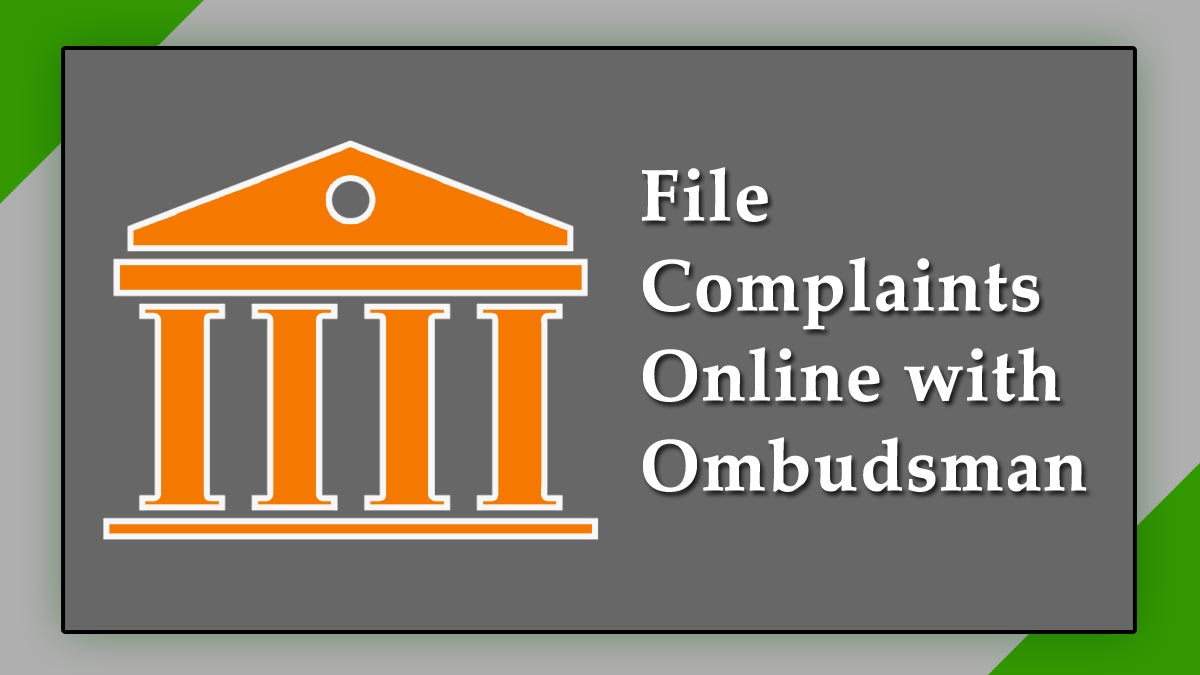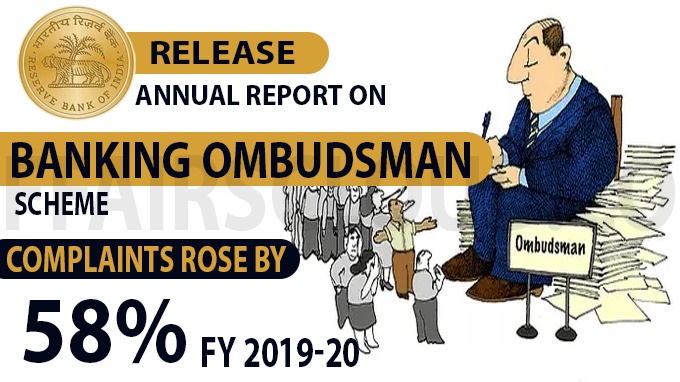BANKING COMPLAINTS WITH RBI’S OMBUDSMAN

Table of Contents
REGISTRATION OF BANKING COMPLAINTS WITH RBI’S OMBUDSMAN
BRIEF INTRODUCTION
We all know that Reserve Bank of India, has been termed as the central banking institution of India, which is vested with the responsibility to controls the monetary policy of Indian rupee. To know the functioning of India’s apex banking institution, let’s first take a glance at a number of its main functions. Here we go:
- Banking Licence Issuer
According to Sec 22 of Banking Regulation Act, before starting operations in India, every bank has to obtain a licence from RBI.
- Monetary Authority
To stabilise the rate of exchange, attain financial stability, maintain a balance of payment and control inflation, RBI controls the flow of money within the Indian economy.
- Currency Issuer
In order to maintain and run the currency and credit system, RBI has been vested with the authority to issue currency in India. They also keeps a record of the circulation of fake currency within the country.
- Banker for the Govt.
RBI also provides credit to central and state governments, however, the tenure of such funds is short term only.
- Banker’s Bank
Banks can get loans issued from RBI. for the same, they also keep their collaterals as security and borrow money just in case of a crisis.
- Foreign Exchange Manager
RBI is the custodian of Forex, therefore they are responsible for the administration and enforcement of the provisions of Foreign Exchange Management Act (FEMA), 1999. Additionally, it also buys and sells foreign currency to take care of the exchange rate of Indian rupee v/s foreign currencies.
These are just some of the main roles played by RBI. other than these, RBI also looks into consumer complaints. have you ever been in some sought of situation where you desperately want to lodge a complaint against your bank but don’t have any idea on how to approach it? Whether it’s a nationalised bank or a private sector bank, you’ll lodge a complaint against them just in case you’re dissatisfied with their service.
RBI BANKING OMBUDSMAN

The RBI Banking Ombudsman Scheme was established on 2006, and hence the people/customers were enabled to file their complaints, in order to resolve the banking issues faced by them. The main objective for the introduction of such a scheme, is to enable provide a resolution towards the complaints filed in respect of certain services rendered by banks and hence, facilitates satisfaction or settlement of such complaints. Thus, the Banking Ombudsman is a person appointed by the Reserve Bank of India, and who serves as a quasi-judicial authority.
The ombudsman scheme covers all the banks including commercial banks, regional rural banks, co-operative banks, and public sector and nationalized banks. In fact, many popular banks like SBI have founded a dedicated system to handle online complaints. Presently, there are 15 banking Ombudsmen who are appointed with offices, most of which are within the state capitals.
CATEGORIES OF COMPLAINTS
You can approach the RBI Banking Ombudsman to register a complaint under the subsequent categories:
- Non-payment or inordinate delay in respect of payment or collection of cheques, drafts, bills etc.
- Non-acceptance of small denomination notes tendered for any purpose, and also charging commission in respect of such transaction, without any sufficient cause.
- Non-acceptance of coins tendered and also charging commission in respect of such transaction, without sufficient cause.
- Non-payment or delay in payment in respect of inward remittances.
- Failure or delay in issue of drafts, pay orders or bankers’ cheques.
- Non-adherence in respect of prescribed working hours.
- Failure or delay in providing regular banking facility, being promised in writing by the bank or any of its direct selling agents.
- Delays or non-credit of proceeds to parties’ accounts or non-payment of deposits or non-observance of the reserve bank directives by the respective bank.
- Complaints received from Non-Resident Indians, having bank accounts in India, in respect of delay or failure to receive the remittances or deposits from abroad and other matters related to regular banking.
- Refusal to open bank accounts, without any valid reason for the same.
- Levy of hefty charges, without serving any prior notice to its customer.
- Non-adherence by the bank or its subsidiaries in respect of instructions served by the reserve bank on the matter of ATM/Debit Card operations and Mastercard operations.
- Failure or delay in respect of disbursement of pension.
- Refusal or delay in accepting payment towards taxes, being required by Reserve Bank/Government.
- Refusal or delay in issuing, or providing service or redemption of government securities.
- Forced closure of bank accounts, without serving any prior notice or due to insufficient reason.
- Refusal or delay in closing of bank accounts.
- Non-adherence to the fair practices code, to be adhered by the bank or non-adherence to the provisions of Code of Banks Commitments to Customers, being issued by the Banking Codes and Standards Board of India.
- Non-observance by the banks in respect engagement of recovery agents, being provided in the reserve bank guidelines.
- Any other matter regarding the violation of the directives issued by the reserve bank in respect to banking or other services.
- A customer may lodge a complaint on the subsequent grounds of deficiency in service with reference to loans and advances.
- Non-observance of reserve bank Directives on interest rates.
- Delays in sanction, disbursement or non-observance of prescribed time schedule for disposal of loan applications.
- Non-acceptance of application in respect of loans, without providing any valid reasons for the same.
- Non-adherence towards the provisions of fair practices code provided in respect of lenders, and to be adopted by the bank.
- Non-observance towards any other direction or instruction provided by the reserve bank/Depository Financial Institution/bank/banking concern/banking company.
- Any other matter being additionally recognized by the Banking Ombudsman.
TIME FOR APPROACHING OMBUDSMAN
One can approach the banking ombudsman if:
- The said person has not received any reply from the concerned bank within a period of 1 month from the date of making of complaint with the concerned bank OR
- The bank has rejected the complaint filed with them OR
- The said person is not satisfied with reply provided by the requisite bank.
PROCEDURE TO FILE COMPLAINT WITH THE OMBUDSMAN
In order to file a web complaint with the RBI Ombudsman, follow these steps:
- First of all, login into the official website of the RBI Ombudsman and submit the highlights of the complaint. (https://secweb.rbi.org.in/BO/precompltindex.htm)
- Upload the complaint letter explaining the matter
- Upload the documents in support of the complaint filed.
- Support the compliant with a copy of the original complaint, being written to the concerned bank.
- Also, provide a copy of the response, being received from the concerned bank.
- All these documents must be uploaded on the web site in pdf or .txt format only
KEY POINTS
Here are certain details which one must keep in mind once they are to file a complaint with the RBI Banking Ombudsman:
- The present complaint can’t be reported to the banking Ombudsman by either party. In other words, you can’t re-register a complaint if you’ve got received a solution already
- The present complaint shall not relate to any previous proceeding, being pending at the end of the Office of the Banking Ombudsman.
- The subject matter must not have been placed before or decided by any forum/court/arbitrator earlier.
- The RBI Banking Ombudsman doesn’t charge any fee for resolving customers’ complaints. the simplest way forward is to settle things amicably with the bank. After all, banks need their customers and can make sure that they resolve issues, especially if there’s a written complaint.
While a Banking Ombudsman will surely help resolve all of your problems, we’ve got a bunch of financial products that might help you re solve your financial problems also.
Reserve Bank of India’s Positive Pay System
• Despite the fact that the Reserve Bank of India’s (RBI) Positive Pay System went into effect on January 1, 2021, several major Indian banks have already adopted it. It was put in place to protect citizens and banks from check fraud. Axis Bank, on the other hand, will implement the same from September 1 onwards.
• Intriguingly, the RBI has stated that it will only accept cheques that have been registered with the Positive Pay System.
PNB’s savings account has a new rule.
New rule for PNB savings account
• Starting from September 1, 2021, Punjab National Bank (PNB) will lower its savings deposit interest rates. The new interest rate is 2.90 percent per year and will apply to both existing and new savings account customers.
**********************************************************
If this article has helped you in any way, i would appreciate if you could share/like it or leave a comment. Thank you for visiting my blog.
Legal Disclaimer:
The information / articles & any relies to the comments on this blog are provided purely for informational and educational purposes only & are purely based on my understanding / knowledge. They do noy constitute legal advice or legal opinions. The information / articles and any replies to the comments are intended but not promised or guaranteed to be current, complete, or up-to-date and should in no way be taken as a legal advice or an indication of future results. Therefore, i can not take any responsibility for the results or consequences of any attempt to use or adopt any of the information presented on this blog. You are advised not to act or rely on any information / articles contained without first seeking the advice of a practicing professional.